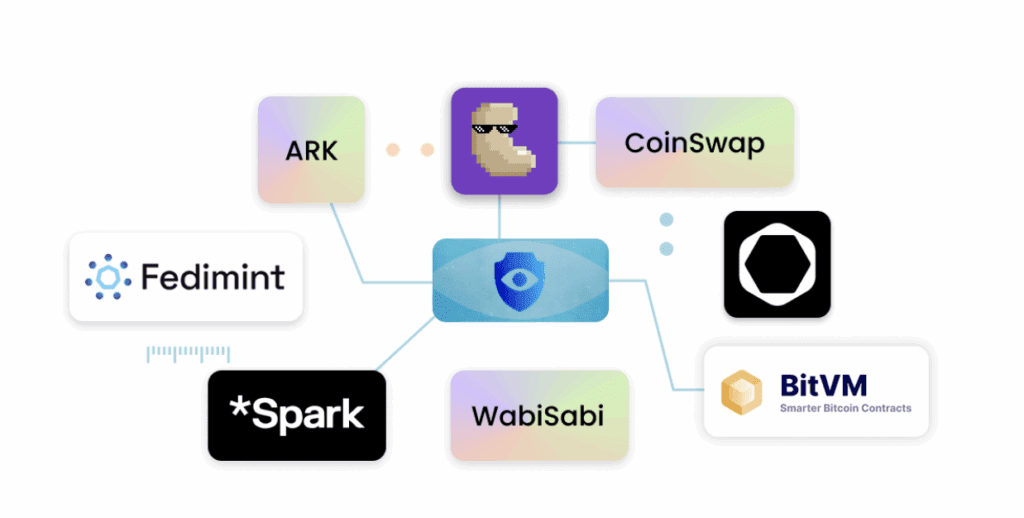Four years ago, in a building in the former industrial heart of Prague, Eric Sirion sat at his computer with freshly written code and a simple mission: buy a cup of coffee with Bitcoin.
The place was Paralelní Polis, during the annual Hackers Congress — a fitting venue for an experiment in digital freedom. This was not the first time Bitcoin had been used to buy coffee, but this time was different. After a few false starts, the transaction finally went through, and history was made. It was the world’s first purchase using ecash on Bitcoin — specifically, the Fedimint ecash protocol, a Chaumian ecash system built on top of Bitcoin.
Eric marked the moment with a tweet, and what seemed like a small act — just coffee — became something far greater.
A spark had been lit.
A Legacy of Privacy
To understand the significance of that coffee, we must look further back.
In the 1980s, David Chaum introduced the concept of ecash, pioneering digital money that was private by default through cryptographic innovation. His company, DigiCash, was ahead of its time, but the core idea endured: money that works like cash — untraceable, fungible, and private.
Years later, Hal Finney, the recipient of the first Bitcoin transaction from Satoshi Nakamoto, recognized Bitcoin’s potential but also its limits. He foresaw the need for layers on top of Bitcoin that could deliver stronger privacy protections, echoing Chaum’s vision while grounding it in the resilience of Bitcoin.
When Eric Sirion bought that coffee in Prague, he was building on this lineage — carrying Chaum’s ideas and Finney’s foresight into a working protocol for private payments atop Bitcoin.
From a Cup of Coffee to a Movement
In the months that followed, the Fedimint protocol was released, development accelerated, and adoption began to spread. Soon after, another protocol — Cashu — emerged, offering a single mint model that offered easier setup and rapid experimentation. Fedimint, by contrast, enabled resilience through multi-party federated custody. Together, these approaches added fuel to what has become a vibrant and growing ecash ecosystem.
Since then, more and more projects aiming to scale Bitcoin have begun exploring or implementing enhanced privacy on top of the hardest money the world has ever seen. This reflects a growing recognition that scaling Bitcoin without privacy leaves the most vulnerable exposed.
- BitVM — a new scaling solution, has inspired the concept of ZK Coins — an ecash-like system with reduced trust assumptions that is still in development but promising.
- ARK — a layer 2 that provides a way to scale lightning transactions in a trust-minimised way is still early, but has been exploring privacy as one of its potential core features.
- Spark — a system using statechains to increase Bitcoin’s transaction throughput has more recently gained traction, and is already committed to adding privacy capabilities as it evolves.
On-chain innovations like WabiSabi, CoinSwap, and Silent Payments are also advancing — making it harder to trace transactions and reducing address linkability without introducing new trust models.

What we’re seeing is not a single movement led by any one protocol, but a certain consciousness rising across the Bitcoin ecosystem: privacy cannot be optional. Ecash, with its visibility and practical use cases, has been at the vanguard of this conversation. Its progress may have helped influence or accelerate broader interest, but it is ultimately part of a larger push — uniting multiple projects, on-chain and off, around the shared goal of protecting financial privacy on Bitcoin.
“Without privacy, Bitcoin risks becoming vulnerable to coercion and abuse. With privacy, it becomes a lifeline.”
Why Privacy Matters More Than Ever
This is not just a technical debate. The stakes are real.
Around the world, ecash is already being used by some of the most disempowered communities — people living under authoritarian regimes, activists and journalists working under constant surveillance, families simply trying to transact safely without being monitored or censored.
As authoritarianism rises globally, the need for private tools is only growing stronger. Without privacy, Bitcoin risks becoming vulnerable to coercion, surveillance, and abuse. With privacy, Bitcoin becomes a lifeline: offering empowerment to everyone, and especially to those who need it most.
Ecash Coffee Day: From Celebration to Rallying Call
Last year, we at Fedi began celebrating Ecash Coffee Day as a lighthearted way to mark the third anniversary of that first ecash coffee purchase on Bitcoin. But today, it carries a much deeper meaning.
Ecash Coffee Day should not only commemorate where we’ve come from — it should serve as a call to action. An anchor date that reminds us of the unfinished work ahead. Until Bitcoin has privacy by default, for everyone, everywhere, our job is not done.
This day should remind us that privacy is not an add-on, not a luxury, and not just a feature request. It is a non-negotiable cornerstone of freedom. And even when we achieve strong privacy on Bitcoin, Ecash Coffee Day should endure — reminding us to maintain it, defend it, and ensure it never erodes.
So, let us mark this anniversary not just with celebration, but with commitment.
Commitment to building, funding, and supporting privacy-preserving technologies.
Commitment to ensuring that the next four years see not just experiments, but mass adoption.
Commitment to the principle that the ability to transact privately is a basic human right.
Because in the end, it isn’t just about code, or protocols, or even Bitcoin itself. It’s about people — and their ability to live, to thrive, and to be free.
Four years on — one Bitcoin halving — the lesson of that coffee in Prague could not be clearer: Private Is Key.
That is, transactional privacy — ideally operated by private individuals — is essential for Bitcoin to truly succeed.